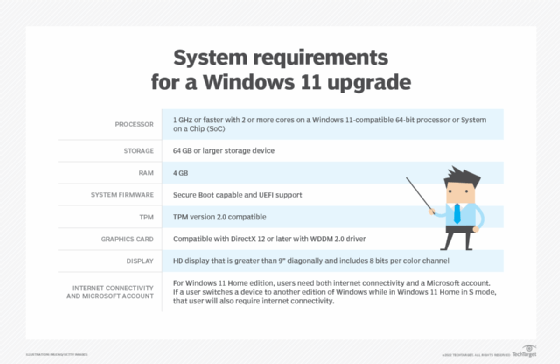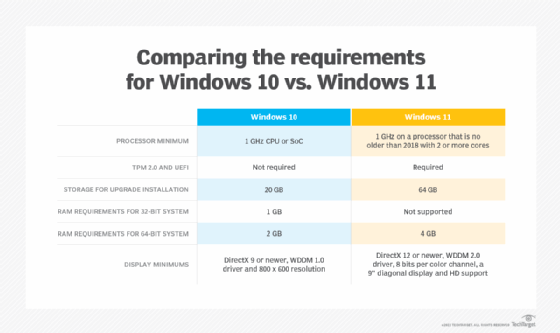
Getty Images
The Windows 11 system requirements and what they indicate
When organizations consider upgrading to Windows 11, they need to compare the Windows 11 system requirements to their existing hardware before making the move.
With the first public release of Windows 11 in October 2021, Microsoft somewhat strayed from tradition by making the system requirements for Windows 11 more stringent and demanding than the typical one-step Windows upgrade.
PCs and laptops that include CPUs manufactured before 2018 are unlikely to meet those requirements. Other security-related Windows 11 requirements can leave older PCs unlikely to qualify.
Minimum Windows 11 system requirements
For starters, Microsoft stipulates that a device must be running Windows 10, version 2004 or later, to upgrade to Windows 11. Endpoints running older OSes must upgrade to Windows 10 before an upgrade to Windows 11 is possible (Figure 1).
For most organizations, the Windows 11 system requirements may include three common issues.
1. Processor. Microsoft will permit administrators to install Windows 11 on older hardware but may withdraw update support -- including the extremely important security updates -- at any time in the future.
Desktop administrators can determine which processors qualify for Windows 11 by checking the respective listings for Windows 11 running Intel, AMD and Qualcomm processors on Microsoft's website. In general, 8th-generation CPUs or newer for Intel and AMD are suitable. EPYC 7xxx, or Ryzen 3, 5 and 7 models numbered 29xx, 31xx, 53xx or newer work as well. The ARM -- or Qualcomm -- list is short. Only 8 CPU models are suitable for Windows 11: Snapdragon 7c, 850, 8c, 8cx and MS SQ1&2.
2. System firmware. The PC must support the modern Unified Extensible Firmware Interface and be secure boot capable. However, secure boot does not have to be enabled.
3. TPM 2.0. The computer must run or emulate the Trusted Platform Module (TPM) 2.0 interface to protect startup and provide secure, encrypted storage for important passwords and credentials.

Comparing Windows 10 requirements to Windows 11 requirements
While the differences between these two systems requirements are mostly straightforward, desktop administrators should still carefully compare these two sets of requirements during the planning process.
For example, the display settings for Windows 11 are far more rigorous than the equivalent Windows 10 minimums (Figure 2). Organizations may need to purchase new monitors to meet these if their hardware is outdated.

Is Windows 11 worth the trouble?
The answer to this question may not matter much, considering that Windows 10 end of life is currently set for October 14, 2025. This gives organizations time to plan a hardware refresh for PCs that can't meet Windows 11 minimum requirements. The good news is that most PCs purchased after June 2018 should easily meet Windows 11 hardware requirements. These devices and newer ones will routinely meet all requirements from Microsoft.
The biggest promised advantage of Windows 11 is its improved security. This explains the requirement for a newer processor, enhanced system firmware and TPM requirements, as they can lead to more robust security controls. However, Windows 11 doesn't presently make any special use of these capabilities that Windows 10 cannot.
In the future, Microsoft plans to take better advantage of these advanced security technologies with future Windows 11 releases. Windows 11 devices with a Microsoft Pluton security processor are expected to come to market later in 2022.
Corporate uptake of Windows 11 is still minimal, but this is more of a comment on the OS adoption process for enterprise organizations than the quality of the OS. A 2022 Lansweeper analysis of 10 million devices found that under 1% of PCs were running Windows 11 at the time of the survey. That same recent analysis showed 45% of the sampled machines met the Windows 11 hardware requirements. This underscores the need for organizations to audit their PC and laptop fleet and determine how many are upgrade eligible.






